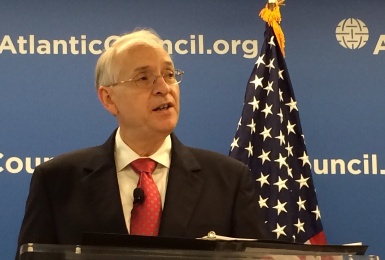US envoy ready to engage in “frank” dialogue with Sudan
October 9, 2014 (WASHINGTON) – The US special envoy for Sudan and South Sudan, Donald Booth, on Thursday expressed his readiness to visit Khartoum to resume discussions on bilateral relations and how Washington can support efforts for peace and democracy in the east African country.

Sudanese officials consider that US policy towards Khartoum is dictated by pressure groups and question publicly its cooperation with American officials saying their country is still subjected to economic sanctions despite long years of close cooperation on counter-terrorism and the independence of South Sudan.
However, different sources in Khartoum say the foreign ministry and other government officials seek to convince president Omer al-Bashir on the need to receive the American special envoy regardless of his real aptitude to change the course of events.
“Despite the disappointments of the past, I believe there remains an opportunity to realise a better relationship; and we must engage toward this end,” said Booth in remarks delivered at the non-partisan think-tank ,the Atlantic Council in Washington.
“We must together chart a course forward. To this end, I reiterate my readiness, and that of my government, to engage the Sudanese in a more frank and frequent exchange, to visit Khartoum, and to discuss the full range of issues that frame our bilateral relationship,” he further stressed.
The American diplomat recalled the principles of US policy towards Sudan stressing that the interest of his country is to see a democratic Sudan in peace with itself and with the neighbouring countries
“Our concern for marginalised populations, our interests in the resolution of deadly internal conflicts, and our support for democratic governance derive from principles that reach far beyond Sudan’s borders,” he emphasised.
NATIONAL DIALOGUE
Booth also reiterated his country’s cautious support to the national dialogue process launched by president Omer al-Bashir last January, saying despite the disappointing past initiatives, this time people may hope serious commitment from the Sudanese government.
“The state of the economy, the costs of continuing wars, internal National Congress Party (NCP) dynamics, and scheduled elections might this time provide for openings and some chance for meaningful discourse,” he wondered adding it also can be another “empty exercise” aiming to hold “unfair elections” and renew the regime legitimacy .
The American diplomat recalled that Troika countries, Norway, UK, and the United Sates since last June welcomed the initiative of national dialogue, stressing the need to reach a framework agreement and to create a conduce environment to ensure a successful internal political process.
“But to date, realisation of the promised National Dialogue remains uncertain. In the intervening months, details of the purported dialogue were few, and actions taken by the government appeared to run contrary to its stated intent,”he said.
The Sudanese security service continues to arrest activities and politicians, bans opponents travel while the local press suffers from the daily censorship. Officials justify this repressive policy by saying the dialogue should not be seen as sign of weakness.
The government also refuses to postpone the general election scheduled for April 2014, arguing that the delay would create constitutional vacuum and political chaos.
The ruling National Congress Party further rejects opposition demand for a national unity government during an interim period, accusing it of seeking dismantle the regime.
Booth said the government by refusing to positively respond to the opposition demands wanted to scare them and bring them to accept its plans. He went further to say actually Khartoum’s intransigence pushed them to unite their efforts against the government.
He praised the efforts done by the African Union High Level Implementation Panel (AUHIP) to push the dialogue forward and termed it as “encouraging signals”, adding “but of course the proof will come in timely and measurable progress toward dialogue and agreed reforms”.
President Omer al-Bashir on 27 September held a tough speech against the rebel and opposition forces.
He said the SPLM-N can only resume negotiations on the implementation of the Comprehensive Peace Agreement of 2005, and asked Darfur rebel groups to join the Doha Document for Peace in Darfur. He also alluded to the arrest of the leader of the opposition National Umma Party, saying he has to renounce a deal he signed with the rebels before to return to Sudan.
Observers in Khartoum, say government and NCP documents leaked recently show that hardliners within the regime mainly military and security elements stand against the dialogue process and fiercely opposed to any concession the supporters of the dialogue process want to make.
(ST)
